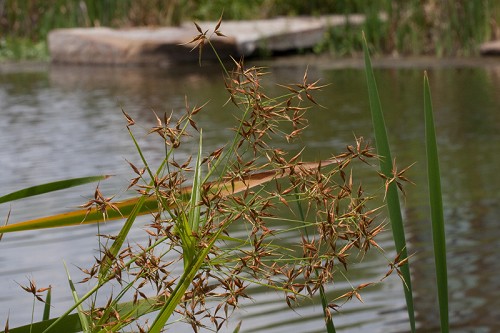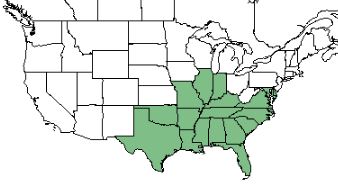Difference between revisions of "Rhynchospora corniculata"
(→Conservation and Management) |
|||
| Line 43: | Line 43: | ||
==Conservation and Management== | ==Conservation and Management== | ||
| + | ''R. corniculata'' is listed as threatened by the Indiana Department of Natural Resources Division of Nature Preserves, and as a weedy or invasive species by the Southern Weed Science Society. <ref name= "USDA Plant Database"/> | ||
==Cultivation and restoration== | ==Cultivation and restoration== | ||
Revision as of 12:48, 29 May 2018
| Rhynchospora corniculata | |
|---|---|

| |
| Photo by John Gwaltney hosted at Southeastern Flora.com | |
| Scientific classification | |
| Kingdom: | Plantae |
| Division: | Magnoliophyta - Flowering plants |
| Class: | Liliopsida – Monocotyledons |
| Order: | Poales |
| Family: | Cyperaceae |
| Genus: | Rhynchospora |
| Species: | R. corniculata |
| Binomial name | |
| Rhynchospora corniculata Lam. | |

| |
| Natural range of Rhynchospora corniculata from USDA NRCS Plants Database. | |
Contents
Taxonomic Notes
Synonyms: Rynchospora corniculata, orthographic variant
Varieties: none
Description
R. corniculata is a perennial graminoid of the Cyperaceae family native to North America. [1]
Distribution
R. corniculata is found in the southeastern corner of the United States. [1]
Ecology
Habitat
R. corniculata proliferates in pondcypress savannas in Carolina bays, swamp forests, and other wetlands. [2]
Phenology
R. corniculata flowers in July and September. [3]
Fire ecology
R. corniculata is not fire resistant, but has a medium fire tolerance. [1]
Conservation and Management
R. corniculata is listed as threatened by the Indiana Department of Natural Resources Division of Nature Preserves, and as a weedy or invasive species by the Southern Weed Science Society. [1]
Cultivation and restoration
Photo Gallery
References and notes
- ↑ 1.0 1.1 1.2 1.3 USDA Plant Database https://plants.usda.gov/core/profile?symbol=RHCO2
- ↑ Weakley, A. S. (2015). Flora of the Southern and Mid-Atlantic States. Chapel Hill, NC, University of North Carolina Herbarium.
- ↑ PanFlora Author: Gil Nelson URL: http://www.gilnelson.com/PanFlora/ Date Accessed: 5/29/18